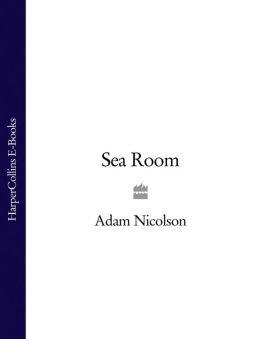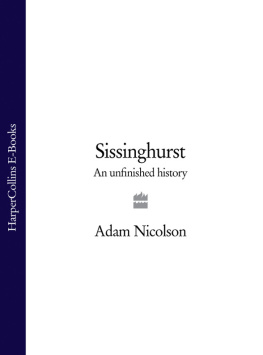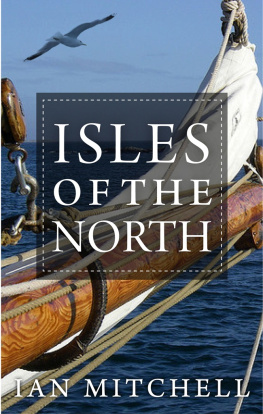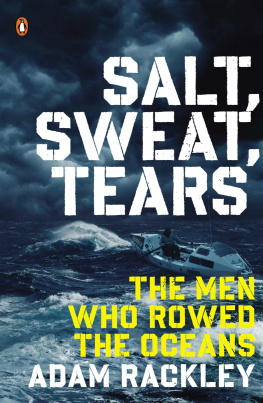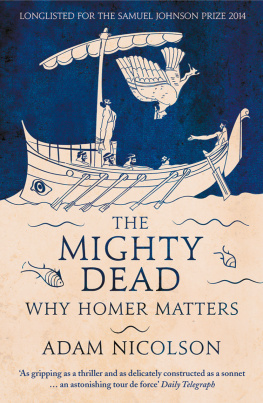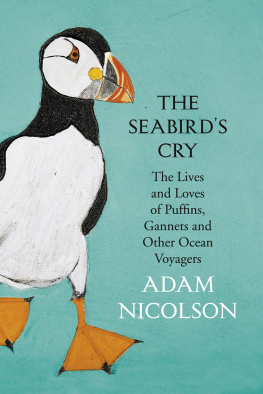ATLANTIC
BRITAIN
Adam Nicolson
HARPER PERENNIAL
for Sarah
Contents
1
The Auk
I was having an affair with the Atlantic. Alone with my books in my room, I had been thinking of little else for weeks. I was longing for the sea. I wanted to get out, away from my desk, into the air, somewhere on the big Atlantic shore of the British Isles, that incomparable, islanded world which has more miles of coastline than the whole eastern seaboard of the United States. Not just to see it, but to sail it, to immerse myself in that ocean side of the country, its long, beautiful wildness, from headland to headland, the place where high winds met hard rock. I wanted days and nights of it. If I thought of openness, or even freedom, it was the Atlantic that filled my mind. I didnt mention it to Sarah. I knew these were, in their heart, treacherous thoughts.
I went down, one Sunday, to the beach on the Sussex coast. Milky rollers poured on to the shingle. The cafe windows stared at them as though the sea werent there. People sat in their cars looking at the waves. From time to time they used their wipers to clear their windscreens of the spray. I drank it in and felt stranded on the shore. To be out there! What would I give for that?
Until the eighteenth century, Europeans thought the sea in general and beaches in particular smelled disgusting. The air on a beach was not full of life-restoring, energising ozone, but stiff with rot. The beach was where the natural order collapsed and the sea beyond it was pure anarchy. It carried no marks of history or civilisation and was filled with nauseating monsters whose flesh turned putrid if ever cast ashore. When, in the first chapter of Genesis, the Spirit of God was said to move upon the face of the waters, those waters were clearly what God was not. The sea was the absence of all meaning, not its source.
But I wasnt living in 1680, I was heir to another tradition. Looking out from the beach suggested to me, as it had to others for two or three hundred years, something larger than the ordinariness of life on land. The Romantic instinct equates roughness with reality. It thinks of the sheer discomfort and violence of the sea as the guarantee of authenticity, the lack of safety a measure, strangely, of truth.
It is a curious fact that you can know why you are acting as you are; be fully aware of the influences which have you in their grasp; understand the damage which those actions might cause; and still be unable to do anything about it. So I talked to Sarah one evening. The sea? she said, a sudden focus in her eyes. Yes, yes, I explained, the sea, the western shore, that wild place, away from here, encountering the world as it was, a boat, perhaps from March to October.
She looked away and said, If that is what you need to do, that is what you need to do. But you have got to make sure we are all right here before you go. She took the idea for what it was, a kind of leaving, a desire to live before you die. I dont want you to go, she said, but I cant stop you.
Alone with an atlas and a cup of coffee, I picked a course, wandering through that ocean-enriched and ocean-threatened world. Not knowing what I wanted or needed, I looked at yachts in magazines. Nor, to be honest, did I know how to sail. I knew the rudiments but little else and had little seacraft, the half-instinctive knowledge of what to do when things go wrong. Blindly, I found a man in the phone book who said he was an expert and drove down to Brighton to see him. It was the first lesson in seamanship. Everything I had been dreaming of, the whole inflated souffle, collapsed on sight. His yacht, something called a Bavaria 46, tied up in the marina, was a big fat white empty plastic thing, a bulbous caravan with too many cabins and no soul. My heart sank. And sank further as the man told me how hed been in the RAF, how this was a cushy number for him, as if the sea was part of the saloon bar, its surface coated in swirly floral carpet, the red cherries on sticks. Its no more difficult to learn than golf, he said, easier in many respects. He had never been to the west coast of Ireland.
I was flummoxed. At home that evening, Sarah -and this was a measure of her strength of mind - said, Why not ring George Fairhurst? I hadnt spoken to him in years, scarcely since we had been sailing together off the coast of the Algarve. But of course he was the man: still in his early forties but a skipper of immense, ocean-going experience, with half a million sea miles under his belt, who had skippered square-sail ships and taken sail-training vessels across the Atlantic, to the Caribbean and back, up the coast of America; an Ocean Yachtmaster, a qualified Yachtmaster Instructor. But more than that, he was quite clearly a man who understood that the sea and sailing were more than just another version of golf, not just another play zone, but a way of being alive. I remembered something he had said to me one night when we were halfway to Ireland with the stars above us, some words from a film, the visions from a sea journey that would be lost in time, like tears in rain
Years ago, he had taught me, more or less, how to sail a yacht and now, perhaps, on this six-month journey from the spring to the autumn equinox, he might teach me again, in a bigger boat in bigger seas, how to be there, how to sail, how to cope.
I rang him on his mobile. He was in the pub in Falmouth. He had just been sailing all day, a big roaring trip up the Channel with some friends. The noise of the pub behind him. I could see his listening face. Did he know of anyone who might come with me on this trip up the Atlantic shore? Who might teach me to sail an ocean-going boat over the course of the year? Who could help me find a boat? Who would be a sympathetic companion with reserves of sea-understanding on which we could draw when things turned for the worst?
He did. No hesitation. He would come. It would be a thing to have done on which the rest of his life could feed. When do we begin?
Well, we need a boat, George.
Ill start looking tomorrow.
The right kind of boat needed to be quite big, forty to forty-two foot, to deal with the Atlantic, particularly as the swells came unbroken on to the west coast of Ireland. No bigger because that would become difficult with just the two of us. It needed a meaty engine as well as good new sails to get out of problems. It shouldnt be one of those elegant New England yachts with long counter sterns and overhanging bows -sleek, leggy supermodels - because they were not made for the big seas that would be our world. She would have to be strong, beamy, and secure. She might not be the fastest, but we could live with that.
We looked for weeks. We toured the harbours and boatyards of England. We scoured the magazines and had sessions on the Internet. There were phone conversations with boat owners in California and Maine. Something for a while looked right in Bergen. But everything had its flaws. Perhaps I didnt entirely know what I wanted in the way of a boat. George walked me round marinas. Did I like the look of that kind of thing? Or that? Was that too flash? Or that too slick? Too big? Too small? Too fat? Too thin? Too little headroom below? Too ugly? Too pretentious? Too sharky? Too cute?
We had by now reached the middle of November. Time was running on and the boat, the right boat, still wasnt showing up. Then, late one evening, George rang me from his mobile. Im on her, he said.
Why are you whispering?
Ive crept aboard. Ive found the hatch open. Theres no one here and Im sitting below and this is the boat. I think this is the one.
I was down there the next morning at dawn, to a marina at Lymington on the Solent. Plastic decks, hi-tech rigs, and long sleek windows like the lenses of wrap-around shades spread around me in aprons of money. But over on a far pontoon, sticking up amid the aluminium, I saw a pair of wooden masts. George was poking around at the base of one of them. There she was. She lay in her skimpy little pontoon berth like a duchess in a supermarket, scarcely deigning to consider the indignity of her surroundings. Immensely wooden, larch planks on oak frames, superbly fat around the middle, with volumes of room below, enough berths to sleep eight, the perfect candidate, a substance in her big rounded stem and stern. She was descended, via a good few cream cakes, from the sailing lifeboats of nineteenth-century Norway, designed by the great naval architect Colin Archer - his parents were Scottish - to be safe in a storm. Her forebears had been built to wait offshore in the North Sea and, as bad weather struck, to take fishing boats in tow and claw off a lee shore, holding them like a gaggle of ducklings behind them. She was the kind of boat Erskine Childers used to run guns to the IRA in the Irish Civil War - her innards stripped out below and filled with a glittering pool of rifles. She was as strong as you like and only fourteen years old, built as an apprentice piece in a yard at Heiligenhafen on the Baltic. Here was the boat for the ocean margin. She exuded certainty. She would look after us. She was the one. She was one of us.
Next page

